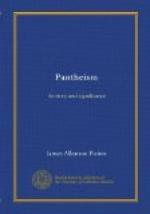[Sidenote: Sympathy thus awakened with the old Pantheistic Aspiration to find the One in the Many.]
In the mood engendered by such familiar experiences of a holiday saunter, it may well occur to anyone to think with interest and sympathy of the poets and seers who, thousands of years ago, first dared to discern in this maze of existence the varied expression of one all-embracing and eternal Life, or Power. Such contemplations and speculations were entirely uninfluenced by anything which the Christian Church, recognises as revelation.[2] Yet we must not on that account suppose that they were without religion, or pretended to explain anything without reference to superhuman beings called gods and demons. On the contrary, they, for the most part, shared, subject to such modifications as were imperatively required by cultivated common sense, the beliefs of their native land. But the difference between these men and their unthinking contemporaries lay in this; that the former conceived of one supreme and comprehensive divinity beyond the reach of common thought, an ultimate and eternal Being which included gods as well as nature within its unity. So, for them, Indra, Zeus, or Jove were mere modes of the one Being also manifest in man and bird and tree.
[Sidenote: The Vedas and Related Literature.]
Every race possessing even the rudiments of culture has been impelled by a happy instinct, which, if we like, we may call inspiration, to record in more or less permanent form its experience of nature, of life, and of what seemed the mysteries of both. To this inspiration we owe the sacred books of the Jews. But it is now generally recognised that an impulse not wholly dissimilar also moved prophetic or poetic minds among other races, such, for instance, as the Egyptians, the Chaldaeans, and the Aryan conquerors of India, to inscribe on papyrus or stone, or brick or palm-leaf, the results of experience as interpreted by free imagination, traditional habits of thought, and limited knowledge. Of this ancient literature a considerable part is taken up by the mysteries apparently involved in life, conduct, and death. Most notably is this the case with the ancient Indian literature called the Vedas, and such sequels as the Upanishads, Sutras, and—much later—the Bhagavad Gita. This collection, like our Bible, forms a library of writings issued at various dates extending over much more than a thousand years.




